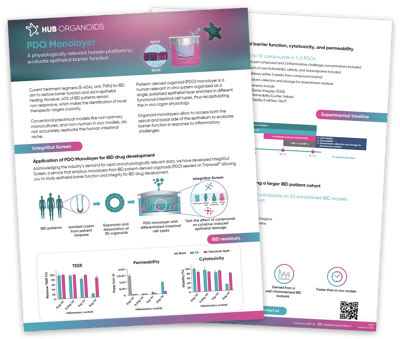INFO SHEET
PDO Monolayer for Inflammatory Bowel Disease (IBD)

Current treatments for inflammatory bowel disease (IBD), such as 5-ASAs and anti-TNFs, aim to restore gut barrier function and promote epithelial healing. However, up to 40% of IBD patients fail to respond to these therapies, highlighting the urgent need for new treatment approaches and therapeutic targets. Traditional preclinical models, including non-primary monocultures and non-human in vivo models, lack the ability to accurately replicate the human intestinal environment, limiting their translational relevance.
Patient-Derived Organoids (PDO) Monolayer: A Breakthrough in IBD Research
Our patient-derived organoid (PDO) monolayer is an innovative in vitro model that closely mimics the in vivo human intestine. This model, derived from IBD patients, is structured as a single, polarized layer composed of various intestinal cell types, providing a physiologically relevant platform to study epithelial barrier function and gut inflammation.
PDO monolayers allow comprehensive assessment of both apical and basal sides of the epithelium, offering critical insights into IBD treatment responses and inflammatory challenges.
IntegriGut Screen: Accelerating IBD Drug Discovery with PDO Monolayers
To meet the increasing demand for fast, reliable, and human-relevant data, we developed IntegriGut Screen, a cutting-edge service utilizing PDO monolayers. This system delivers high-quality human data on epithelial barrier integrity, cytotoxicity, and cytokine release, all crucial for IBD drug discovery and development.
Download Our Infosheet to Learn About:
- The process of developing PDO monolayers for modelling epithelial barrier damage in IBD.
- An overview of IntegriGut Efficacy Screen, including its strategic design, experimental timelines, and available readouts.
- An introduction to IntegriGut Biobank Screen, featuring insights from our extensive IBD biobank.
download now
